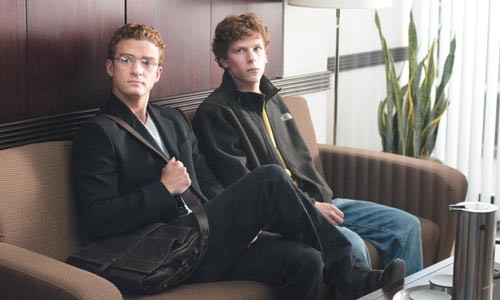Somewhere toward the end of David Fincher's deliciously entertaining account of how Mark Zuckerberg created Facebook, I thought: If they make the movie of my boring life, I hope Aaron Sorkin writes the script -- and that they find a role for Justin Timberlake.
There's been much pre-release buzz about The Social Network (whose title is both a snarky generic and a wink to the film's dramatic structure) and plenty of it has been pooh-pooh. "Call me when they do Google: The Movie"; assorted grumbling from the Facebook haters; and Zuckerberg's entirely coincidental $100 million donation to Newark, N.J.'s public schools.
Turns out none of that really matters: This is a snappy re-write of the age-old story about how the quest for power/fame/fortune leaves a trail of personal wreckage. It could be Citizen Kane, What Makes Sammy Run? or a particularly good Behind the Music. No prior knowledge of Facebook is required. And relax, Mr. Zuckerberg: Jesse Eisenberg's portrayal of you as an awkward, petty, brilliant, ambitious social-networking king -- one with virtually no social skills of his own -- has probably done you a favor. Eisenberg adds some humanity, and the film even ends with a sad but sympathetic "Rosebud" moment.
The Social Network, directed with lots of zip by Fincher (Seven, Fight Club), covers the few months between Zuckerberg coding "The Facebook" in his Harvard dorm room, in early 2004, and Facebook's 1,000,000th sign-up, an event celebrated in spiffy new Silicon Valley offices.
Ben Mezrich's 2009 book The Accidental Billionaires: The Founding of Facebook, A Tale of Sex, Money, Genius, and Betrayal serves as source material, but the lively, bantering script by Aaron Sorkin (West Wing) suggests plenty of literary license. And a good thing, too: The film opens with Zuckerberg on a disastrous date, a brilliant set-piece of two talking-heads in which we learn nearly everything we need to know about the brainy, self-absorbed sophomore.
Sorkin weaves three threads to tell how Facebook made Zuckerberg the world's youngest billionaire, albeit not the most beloved. Besides the 2004 start-up narrative, we also check in with two ongoing lawsuits occurring some time later. One finds Zuckerberg's ex-best friend Eduardo Savarin (Andrew Garfield) relating how he was betrayed by his buddy; the other presents three well-connected Harvard students claiming that Zuckerberg stole the idea of Facebook from them. (Two of these three, who are actually named Winklevoss, even take their complaint to Harvard's then-president Larry Summers. Did that really happen? Who cares? It's an hilarious scene.) These depositions, which were undoubtedly deadly dull in real life, zing with barbs and take-downs, while serving to re-contextualize the creation of Facebook we're also watching.
Eisenberg has played plenty of stumbling, bumbling nerds before, from The Squid and the Whale to Zombieland, and he colors in that side of Zuckerberg as expected. But his Zuckerberg isn't so warm and cuddly: He's prickly and cold-eyed; a smart but nearly sociopathic power-nerd who wields code as a weapon; a self-serving tool who is moving too fast to see (or care about) the human beings around him. Zuckerberg is not without emotion, but Social Network suggests that it is insecurity, loneliness and frustration that rule his heart.
It's easy to surmise that Zuckerberg creates Facebook in part because he wants to be recognized and popular. (Renown he gets. Friends -- not so much.) But he does attract one whiz-kid Net-rock-star, Sean Parker, who is riding the infamy of his music-sharing site, Napster. Portrayed with a wink by Justin Timberlake, Parker has all the brio and social dynamism that Zuckerberg lacks, and the scenes of Zuckerberg gazing adoringly as Parker prattles on are rich. In the key scene -- set in a nightclub, where Parker convinces Zuckerberg to go big-bigger-biggest -- Fincher bathes Parker in crazy colored lights, rendering him as a manic, beguiling cartoon-devil drawing Zuckerberg deeper into the rewarding darkness.
The Social Network is a rags-to-riches morality tale ripped from the business pages, and maybe not even one word of it is true. Except that Facebook was a great idea, perfectly marrying technology with our own self-absorption and keening need to be social. After all, 500 million friends can't be wrong ...
















